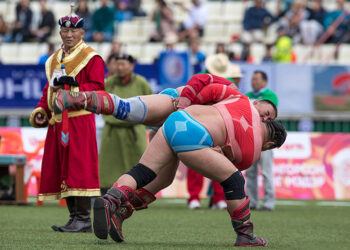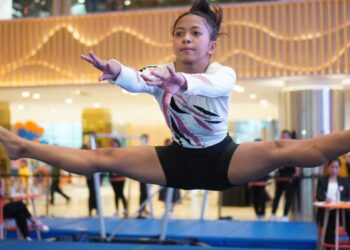Eleven sport governing bodies are demanding an overhaul of the way Britain invests in the pursuit of Olympic and Paralympic medals.
In an unprecedented challenge to elite performance funding agency UK Sport, the group have joined forces to call for an urgent review of what they call “a two-class system that runs counter to Olympic ideals”.
National Lottery money is currently allocated on the basis of medal potential, helping to transform the country’s sporting fortunes.
But amid an athlete welfare crisis and various governance problems, UK Sport has faced mounting criticism over its approach.
The 11 sports – archery, badminton, baseball/softball, basketball, fencing, handball, volleyball, weightlifting, wrestling, wheelchair rugby and table tennis – were all left without funding when UK Sport announced its £345m plan last December.
This was despite badminton meeting its medal target at Rio 2016 and table tennis and weightlifting showing signs of progress.
Instead of UK Sport’s “no compromise” approach to picking winners, the unfunded sports want a “tiered support structure” that would guarantee every Olympic and Paralympic sport a base level of funding.
- Huge concerns over athlete welfare – Grainger
- Should welfare come before winning?
- Elite funding ‘cut-throat’ – Redgrave
Incoming UK Sport chair Dame Katherine Grainger told BBC Sport she understood why the sports had taken a stand, but said: “It’s not fair to say we’re narrowly focusing on a few sports.”
The unfunded sports believe they can all be backed if UK Sport cuts the amount it spends on bringing major events to this country, its budget for getting British administrators into international federations and the £67.4m it gives to the English Institute of Sport (EIS), the organisation that provides sports-science services to most Olympic and Paralympic sports.
The EIS’s headcount has been growing and will top 300 next year, but it has taken on more responsibilities, works with the vast majority of British athletes and is considered to be a world-leading service.
What do the sports say?
In a joint manifesto calling for “a new approach” to investment, the 11 sports – which include Archery GB, British Basketball, British Weightlifting, Badminton England, GB Wheelchair Rugby and Table Tennis England – all of which have suffered funding cuts – said the existing approach to National Lottery investment “has been conspicuously successful in winning medals, but has disenfranchised many of the country’s elite sportsmen and women, creating a two-class system that runs counter to Olympic ideals.
“Providing opportunities for elite British athletes in all relevant sports to compete in the Olympics and Paralympics need not run counter to the pursuit of medals, and will make the nation even prouder of TeamGB’s and ParaGB’s triumphs.
“We call on Dame Katherine Grainger to recognise the dangers inherent in the current direction of travel. We urge UK Sport to recognise that medal targets alone should not be the sole criteria for its funding.
“We believe UK Sport should adopt a revised investment model that embraces every Olympic and Paralympic sport, with a tiered support structure”.
The sports say their new approach is “readily affordable from economies within UK Sport’s support costs, and from within the English Institute of Sport. Time is pressing and debate must begin now”.
How have funding cuts affected sports?
Adrian Christy, the chief executive of Badminton England – which lost all of its £5.74m funding from UK Sport this year in the wake of Rio 2016 – told BBC Sport: “We have a very clear view that every sport in this country matters.
“We’ve seen lots of sports that have lost their funding, we’re one of those. And as a consequence of that it’s really difficult to see how your long-term development of athletes can continue to inspire a nation. We’ve made a third of our staff redundant in the last several months, we’ve cut our performance programme in half.
“This is a demand for UK Sport to take a long hard look and say ‘are medals and medallists the only metric which investments into sports can be made?’ We don’t believe it is.”
Can UK Sport afford to change?
With Team GB winning 67 medals in Rio, and Para GB then claiming 147 medals, many are reluctant to change a system that has transformed British success since 1996 when the country finished 36th in the medal table.
But Christy disagrees.
“We are not for one second asking to take money away from sports,” he said. “The target around medals would still be the same. We believe there are opportunities for UK Sport to look within their own budgets and save money elsewhere. We’ve been thrown under a bus.
“We don’t believe the cost of funding the sports is more than 4% of the overall total pots of money of UK sport. 4% to say another 11 sports, the maths of that is about another 100 athletes in a position to represent Great Britain – and who knows, add to the medal table that we won in Rio.”
What do funding chiefs say?
Former rower Dame Katherine Grainger, who takes up her new role as chair of UK Sport on Saturday, said: “If I were in their shoes I’d be doing the same. In any organisation, you do everything you can to protect the athletes. So when that funding is cut you’d do anything to get that back.
“So calling for a review is a very realistic and credible thing to do and I’m not surprised they’ve done it now.
“There will be a review, there is every four years. Obviously, things change, the climate changes, sports change, pressure of resources changes, so that’s why it’s always worth looking at again and I’m very confident to see that it will be reviewed again, it just won’t happen instantly.”
However, Britain’s most decorated female Olympian added: “If you look at the success of Rio, then we got more medals across more sports than we’ve done before. Our actual breadth of success is growing all the time, so it’s not fair to say that we’re narrowly focusing on a few sports.
“What is fair to say is that our money is finite and it’s not stretching. As more sports are more successful, the irony is that the money can’t go as far.
“If there is anything that can be cut, but not at the expense of success, then it will be. But right now that’s the situation we’re in.
“People I’ve met in my short time here so far are really passionate about improving things, so actually if 11 sports do come and say ‘we want things done differently, is there a better way to do this?’ then actually let’s look at it.”
Ed Warner, who recently stepped down after a decade as chair of UK Athletics, said: “Winning medals is important, but more important still is winning them in the right way.
“Katherine Grainger’s arrival at UK Sport is a wonderful opportunity for her to challenge the groupthink that constrains the current system and to put in place a new funding structure that embraces all Olympic and Paralympic sports, because every one of them matters.”
But Grainger also added a cautionary tale from her own experience.
“I started rowing at a time when we kept our boats on scaffolding poles under a bridge – we didn’t have the set-up we have now. The facilities have been transformed,” she said.
“So you look not just at the medal success but at the level of support we have, the coaches, the training camps. I don’t think many athletes would like that to slip back to a stage where we just wouldn’t be competitive internationally.”
A British Olympic Association spokesperson said: “We fully understand the anxiety of those sports as they face the reality of current funding decisions.
“We are constantly looking at ways to support unfunded sports within our membership, including through the allocation of Olympic Solidarity funds to athletes where possible.
“If we are to increase third party funding of sport then we must work to protect our country’s stellar performances in the medal table, and in doing so the work of our colleagues at UK Sport in developing an acclaimed World Class Programme.”
A British Paralympic Association spokesperson said: “We are very proud of the success of the ParalympicsGB team – second in the medal table at Rio 2016 and winning medals across more sports than ever before – which has provided the inspiration not only to get more people engaged in sport but fundamentally to challenge and change attitudes to disability in society.
“We must look at the overall public funding system for sport at all levels and at what alternative streams can be developed to ensure that sports can continue to maximise their opportunity and impact.”
[Source”indianexpress”]






